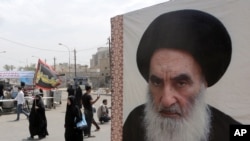Iraq's top cleric called again on compatriots on Friday to unite against the “big danger” posed by Islamic State militants, whose advances prompted U.S. President Barack Obama to authorize limited bombing.
In a weekly Friday sermon delivered through a spokesman in the sacred Shi'ite city of Karbala, Grand Ayatollah Ali al-Sistani blamed Iraqi politicians for Iraq's biggest crisis since the fall of Saddam Hussein in 2003, saying they are motivated by self-interest.
“All Iraqis should unify ranks and intensify efforts in the face of this big danger that threatens their present and future,” said Sistani.
The Islamic State, an al-Qaida spin-off, swept through northern Iraq in June, almost unopposed by Iraq's U.S.-funded and trained army, and has made gains since then.
Friday's sermon marks the second time that Sistani has called on Iraqis to stand up to the Islamic State, which has threatened to march on Baghdad and wants to reshape the map of the Middle East to impose its radical ideology.
Sistani said that politicians who cling to their posts are making a “grave mistake”, piling pressure on Shi'ite Prime Minister Nuri al-Maliki to drop his bid for a third term.
Sistani urged politicians to stop bickering and choose a prime minister who can unite Iraqis and end the crisis posed by Sunni insurgents.
“All political parties should know that conflicts and differences among each other - which in many times have no justification but self-interest or sectarian or national interests - have caused the weakening of everybody and opened the door for the terrorists,” he said.
Over the past week, the Sunni militants have made another dramatic push through the north, seizing a fifth oilfield and several more towns and reaching Iraq's biggest dam after routing Kurdish forces.
Reuters photographs published on Thursday showed what appeared to be Islamic State fighters controlling a checkpoint near the border with the Kurdish semi-autonomous region.

